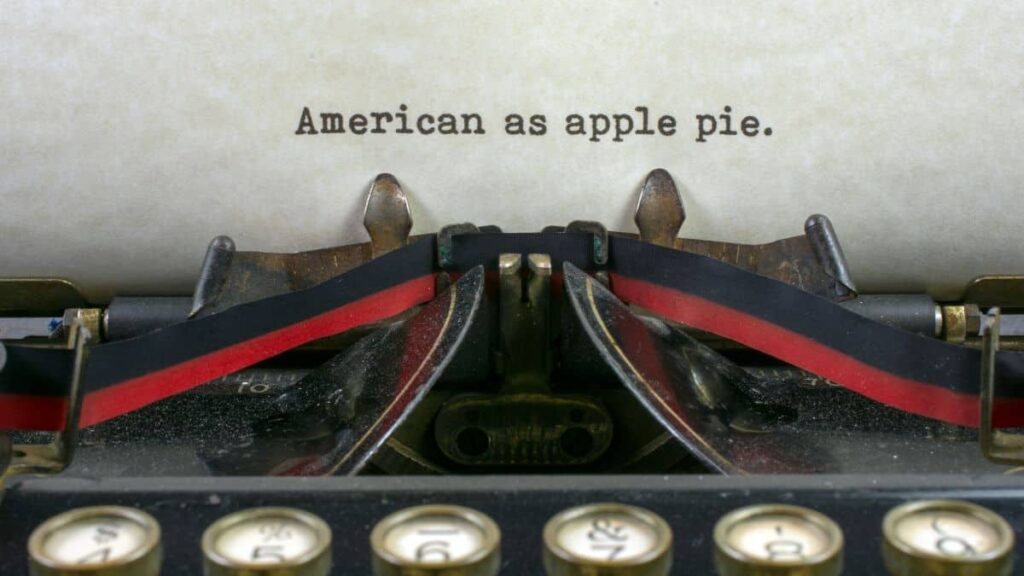26 American Sayings That Confuse Foreigners
the American language is rich in expressions and idioms. Some like “to kill two birds with one stone” is easily understandable and translatable in other languages. However, Americans often use idioms that can easily confuse foreigners.
Phrases like “spill the beans,” “don’t cry over spilt milk,” “quit cold turkey,” and “monday-morning quaterback” actually have nothing to do with food nor sports.
Here are 26 phrases Americans say that leave foreigners confused. If you’re not from the USA, you’ll love learning about these when prepping for your next US trip.

1. “Bite the bullet”
“Bite the bullet” originates from a time when patients would literally bite a bullet during surgical procedures without anesthesia, to cope with the pain. The phrase has evolved to mean facing a difficult situation with courage, enduring discomfort or pain without showing fear. Although no actual bullet is involved, the saying symbolizes the strength needed to bravely confront challenging situations.
2. “Break the ice”
“Break the ice” originally referred to ships breaking through ice to navigate waters but has since transitioned into a social context. It means to initiate conversation or take an action to ease tension in an awkward or tense setting. The phrase has nothing to do with actual ice but is about making a comfortable and welcoming environment in social interactions.
3. “Jump on the bandwagon”
The term “bandwagon” was popularized by 19th-century American showman PT Barnum, referring to a wagon carrying a circus band. Politicians later adopted the concept to attract attention, with Teddy Roosevelt helping to cement the figurative phrase in the American lexicon in 1899. Today, “jump on the bandwagon” means to join a growing movement, trend, or cause, often one that is already popular or successful.
4. “Kick the bucket”
“Kick the bucket” is a phrase shrouded in mystery regarding its origins but is universally understood as a euphemism for dying. The saying uses the imagery of kicking a bucket to represent the end of life but doesn’t actually involve buckets or kicking in its application. It’s a less direct way of discussing death.
5. “More bang for your buck”
“More bang for your buck” finds its roots in World War II, referring to getting more firepower for the money spent on bombs. It has since evolved to mean getting the most value for your money. The phrase doesn’t involve actual explosions but is about seeking the best deal or value in any transaction.
6. “Spill the beans”
The idiom “spill the beans” has its origins in an ancient Greek voting system where white beans indicated a positive vote and black beans a negative one. The phrase emerged in the early 20th century in the USA, signifying the act of revealing a secret or confidential information, especially when it disrupts plans or processes.
7. “Shoot the breeze”
“Shoot the breeze” pertains to engaging in casual, unimportant conversations and originates from late-19th-century slang when “breeze” meant “rumor.” The phrase is more about engaging in light, casual talk or “empty chatter” and doesn’t involve actual shooting or breezes, emphasizing the laid-back, informal nature of the conversation.
8. “Piece of cake”
“Piece of cake” was popularized by American humorist Ogden Nash in “The Primrose Path,” symbolizing something very easy to accomplish. The phrase isn’t about actual cake but is used metaphorically to describe a task that is simple and effortless, as easy as enjoying a delicious slice of cake.
9. “Hit the hay”
“Hit the hay” harks back to a time when people slept on mattresses filled with hay. It’s a colloquial way of saying it’s time to go to bed or to sleep. The phrase isn’t about actual hay but is a homely, informal way of indicating bedtime.
10. “Go Dutch”
“Go Dutch” is as American as apple pie, evolving from the earlier expression “Dutch treat,” mentioned in the Baltimore American newspaper in 1873. It means that each person pays for their own expenses during an outing or meal, promoting a sense of equality and independence. The term doesn’t involve the Dutch nationality per se but is about the practice of sharing costs.
11. “Take a raincheck”
“Take a raincheck” originated in baseball, where spectators were given a check to attend a future game if the one they were attending was rained out. The phrase is now a polite way of declining an offer with the implication that the person might be interested in accepting it later. It’s not about actual rainchecks but about postponing an invitation or offer.
12. “Riding shotgun”
“Riding shotgun” was popularized by Hollywood westerns, with the earliest print reference appearing in a Utah newspaper in 1919. It refers to sitting in the front passenger seat of a vehicle, traditionally where someone would sit to protect the driver and vehicle with a shotgun. The saying isn’t about actual shotguns but is about the seat beside the driver.
13. “Paint the town red”
“Paint the town red” likely originates from a wild night out involving some flamboyant or reckless behavior, possibly involving the literal painting of a town’s buildings red. It now means to go out and enjoy oneself flamboyantly, often involving drinking. The phrase isn’t about actual painting but about having a boisterous, lively time.
14 “Barking up the wrong tree”
“Barking up the wrong tree” comes from hunting dogs barking at the base of a tree where they mistakenly believe their quarry is hiding. It means pursuing a mistaken or misguided course of action. The phrase isn’t about actual dogs or trees but about making a mistake or a false assumption in one’s efforts.
15. “Put all your eggs in one basket”
“Put all your eggs in one basket” is a warning against concentrating all efforts and resources in one area, risking everything on a single venture. The saying doesn’t involve actual eggs or baskets but is about the wisdom of diversifying one’s investments or efforts to mitigate risk.
16. “Hit the nail on the head”
“Hit the nail on the head” likely comes from the notion of performing a task, like driving a nail, with precise accuracy. It means to describe exactly what is causing a situation or problem. The saying isn’t about actual nails or hammers but is about being spot-on or accurate in one’s assessment or action.
17. “Let the cat out of the bag”
“Let the cat out of the bag” first appeared with its current meaning in a London book review from 1760. It means to reveal a secret, often unintentionally. Despite the phrase, it’s not about actual cats or bags but about disclosing information that was supposed to remain confidential.
18. “Out of the frying pan and into the fire”
“Out of the frying pan and into the fire” is a phrase that describes going from a bad situation to a worse one. The saying doesn’t involve actual frying pans or fires but is about moving from a difficult circumstance to an even more challenging or dangerous situation.
19. “Quit cold turkey”
“Quit cold turkey” actually originated in Canada and first appeared in a British Columbia newspaper in 1921. It refers to stopping a habit or addiction suddenly and completely. The phrase doesn’t involve actual turkeys but is about the abrupt cessation of a behavior without gradual reduction or assistance.
20. “Don’t cry over spilt milk”
“Don’t cry over spilt milk” has been in use since the 19th century, with historian James Howell using a similar expression in 1659. It means not to be upset about things that have already happened and cannot be changed. The saying isn’t about actual milk but is about accepting past events and not dwelling on regrets.
21. “Break a leg”
“Break a leg” first appeared in print with its current meaning in a US newspaper in 1948, possibly deriving from the German saying “Hals- und Beinbruch.” It’s a way of wishing someone good luck, particularly in the performing arts. The phrase isn’t about actual leg-breaking but is a quirky, superstitious way to wish success without jinxing the outcome.
22. “It’s not rocket science”
“It’s not rocket science” refers to when something isn’t that difficult to understand or accomplish. The phrase compares the task at hand to rocket science, a field known for its complexity, emphasizing that the task is far simpler. It’s not about actual rocket science but about the relative ease of understanding or doing something.
23. “That’s the way the cookie crumbles”
“That’s the way the cookie crumbles” is a phrase used to accept one’s fate or the outcome of a situation, even if it’s not favorable. It was popularized in the 2003 Jim Carrey movie “Bruce Almighty.” The saying isn’t about actual cookies but is about acknowledging and accepting the reality of a situation.
24. “Sounds like a broken record”
“Sounds like a broken record” dates back to 1936 and refers to someone or something that is annoyingly repetitive or persistent. The phrase originates from the days of vinyl records, where a scratch could cause the needle to skip and repeat the same part of the recording. It’s not about actual broken records but about the irritation caused by repetition.
25. “Ballpark figure”
“Ballpark figure” is a financial term referring to a rough numerical estimate. The etymology comes from the Great American Pastime, baseball, likely referring to the general size or scope of a baseball park. The phrase doesn’t involve actual ballparks but is about providing a rough, approximate number.
26. “Monday-morning quarterback”
“Monday-morning quarterback” is a sports-centric phrase that originated in the 1930s. It applies to anyone who second-guesses an action or decision, often after the fact and with the benefit of hindsight. The saying isn’t about actual quarterbacks or Mondays but is about criticizing or offering advice after the event has occurred.
Which is your favorite American idiom? Which do you use the most? Let us know in the comments!
— SAVE THIS POST —
Did you like this post? If you liked this post, don’t hesitate to share it!
Want to save this post? You can pin the following images on pinterest to save this post.
We are Mary and Eric, the founders of Be Right Back, a blog dedicated to romance around the globe and at home.
We are Mary and Eric, the founders of Be Right Back, a blog dedicated to romance around the globe and at home. With over 10 years of experience in dating and traveling to romantic places, we share our favorite date ideas and romantic destinations to help couples level up their relationships. Having lived in and traveled through the USA, we also share our favourite things to do in the States.
With 70,000 monthly readers and 16,000 followers on social media, Be Right Back is your go-to resource for romantic trip ideas and couple activities at home and abroad.
